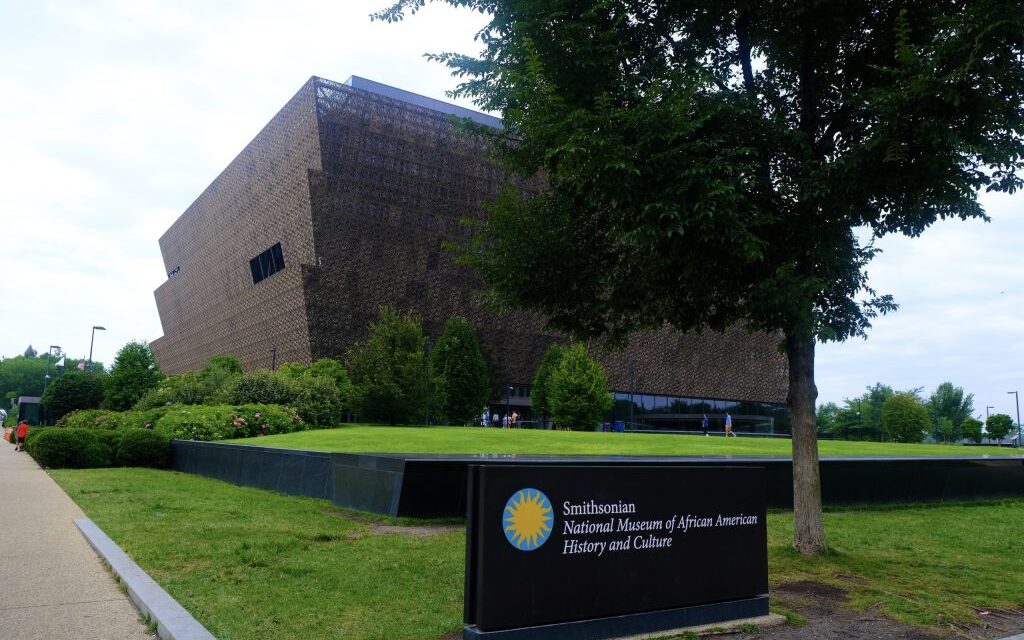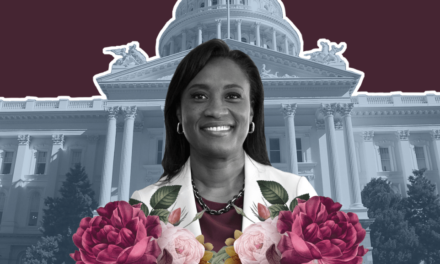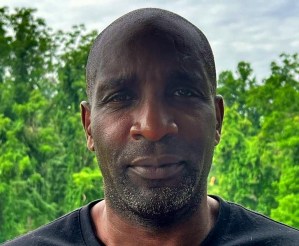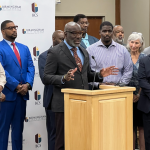By Ashleigh Fields
AFRO Assistant Editor
The Smithsonian National Museum of African American History and Culture (NMAAHC) will display its first official Kwanzaa exhibit until Jan. 1, 2024. A kinara, mkeka mat and a playlist debuted at the museum on Dec. 26.

The week-long Pan-African holiday was originally founded in 1966 by Maulana Ron Karenga to honor seven principles of African history and heritage.
“Kwanzaa is a Black nationalist tradition. It’s a holiday created for Black people by Black people,” said Baba Kelechi Egwim, a member of the D.C. Kwanzaa Planning Committee.
Egwim said the holiday is significant because it is based on customs of Black people and serves as a time to “recognize our greatness.”
“People from all around the world come and visit the museum and they should see all aspects of our culture.”
D.C. Kwanzaa Planning Committee founding member Baba Imamu Kuumba-baucum.
In addition to the exhibit featured in Heritage Hall, the museum will host a screening of “Kwanzaa and Watch Night: Visions of Freedom” on Dec. 30 for guests in person. The movie will showcase both Kwanzaa and Watch Night, a practice that started on Dec. 31, 1862, when African Americans gathered, many in secret, to ring in the new year and await news that the Emancipation Proclamation would take effect on Jan. 1, 1863.
“The African American Museum is such an important part of our city and our country and I think the ability for us to learn of other customs is an important attribute for our community,” said Michael Shankle, local representative for Advisory Neighborhood Commission 2C where the museum resides. “I think Kwanzaa has been underrecognized by other communities in the past and I’m glad the museum is making efforts to help residents learn about the celebration.”
Despite the NMAAHC’s historical effort to highlight the holiday, many local residents still feel it’s not being appropriately recognized. The “Kwanzaa Now Campaign” has been advocating for a more in depth and educational approach.
“We searched for Kwanzaa in the museum in Oct. 2018 and discovered the word ‘Kwanzaa’ was mentioned only once in the museum history collection; the reference was not about the holiday practice, but about its founder,” read a statement on their website. “We later discovered no Kwanzaa events of any kind had been held by the museum…we found one children’s Kwanzaa book in the gift shop, a Kwanzaa pin in their digital database and a small pre-Kwanzaa children program was held Dec. 7, 2019.”
Multiple members of the D.C. Kwanzaa Planning Committee joined the campaign to help advocate for more awareness about the holiday.
Egwim, who is also a member of the Kwanzaa Now Campaign, said he believes the Smithsonian could have done more outreach and consultation to ensure the museum featured a Kwanzaa exhibit in line with community requests.
“We weren’t able to get them to agree to us playing more of a hands-on role,” said Egwim, who believes the inclusion of organizations that annually celebrate Kwanzaa could ensure a Smithsonian exhibit aligned with “the community of folks who created Kwanzaa– as opposed to the universalized version of Kwanzaa.”
“Kwanzaa is not a time to compromise ourselves, it’s a time to empower ourselves, a time to reflect and time to embrace the spirit of Pan-Africanism,” said Egwim. “A celebration among the whole Black population is bigger than anything a corporation or the Smithsonian may have a concept of. Since its creation, it has returned to its origin and become full circle.”
The AFRO reached out to the National Museum of African American History and Culture for a comment but did not receive an immediate response ahead of the time of print.
“People from all around the world come and visit the museum and they should see all aspects of our culture,” said D.C. Kwanzaa Planning Committee founding member Baba Imamu Kuumba-baucum.
Alternatively, the D.C. Kwanzaa Planning Committee organized in 1977, hosts community events yearly surrounding the holiday and has for the past four decades virtually and in-person. Each night, the committee will present free events that focus on the seven principles of Kwanzaa: Umoja (Unity), Kujichagulia (Self-Determination), Ujima (Collective Work and Responsibility), Ujamaa (Cooperative Economics), Nia (Purpose), Kuumba (Creativity) and Imani (Faith). The group says that these tenets should not just be practiced for the week but 365 days of the year.
“The essence of Kwanzaa is the true appreciation of ourselves as Black people, collectively coming together to reflect on and enjoy the infinite beauty of being in the same family, organization and community,” said Baba Rasafik Weusi. “We share the same values, interests, aspirations and engage in committing to the same struggle.”
Every year, the D.C. Kwanzaa Planning Committee joins forces to create an overarching theme for the week.
“This year’s theme is “Stronger Together” and at our Dec. 26 celebration will be discussing the importance of that concept of being stronger in unity and uniformity,” said Kuumba-baucum. “The principle of the day is unity and the family community and the nation and the race and we will be discussing ways and means of how we can maintain family and community in these dire times that we are living in.”
He believes that Kwanzaa deserves to be recognized on a global scale. A detailed list of their events can be found at KwanzaaDC.org.
The D.C. Kwanzaa Planning Committee is committed to promoting the holiday for years to come with hopes of a future partnership with the National Museum of African American History and Culture.
Egwim said the goal of his organization is to help people “get it right” when it comes to Kwanzaa. While he said he is “always willing to be a part of that process,” his coalition can only do so much if their ideas and help are not accepted when offered.
“It’s the only holiday that I’m aware of that exists for Black by Black people to celebrate Blackness,” said Egwim. “This is us celebrating us for seven days, more specifically us celebrating the best of us– not us celebrating individuals– but principles that represent the best of our people.”
The post Black leaders sound off about National Museum of African American History and Culture’s first official Kwanzaa exhibit appeared first on AFRO American Newspapers.











